Backpacking in France
How and where to start, when it comes to showing the advantages of France for a backpacker trip? The history of our neighbour is varied and closely connected with the German history. Whole regions along the French border – Alsace and Lorraine – are influenced by German-French.
Thanks to their multifaceted range of visitors, are basically worth having their own travel guides. The same applies to the coastal and mountain regions, not to mention the capital Paris. Millions of travel guide pages have already been filled with France’s highlights and insider tips.
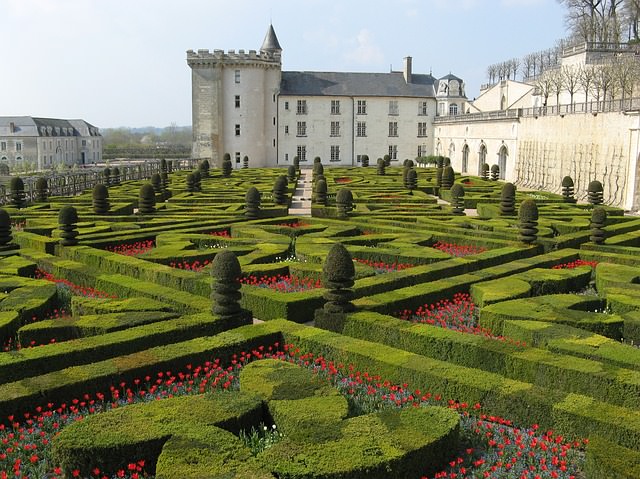
Backpacking in France – Castle
But if you really want to discover the country, you have to take your time. You can experience true France in savoir vivre style. Only the French can really enjoy life, they say. Those who know the variety of gourmet offers will not doubt it. Explore the Channel Coast in Normandy, where Calvados is distilled, or feast on oysters in Brittany.
Around the Paris basin, Roquefort cheeses are produced and in the Pyrenees and the Alps, a typical local diet awaits you. The wines of France in the historic regions of Languedoc, Bordeaux and Loire are among the best in the world. You can also visit the fantastic castles of the Loire Valley at the Gourmet Traveln or take a trip to the Huguenot city of La Rochelle.
No French backpacking tour without enjoying Paris and its sights and the bohemian lifestyle. Montmartre, Louvre, Eiffel Tower, Place Pigalle are just a few of the buzzwords that stand for Paris.
Adventurers and winter sports enthusiasts get their money’s worth in the alpine and low mountain regions as well as the friends of fantastic beaches and water sports. Whether Biarritz on the Atlantic, Nice and Cannes on the Mediterranean or Caen or Mont St. Michelle on the canal, there is concentrated culture to experience on the shores around France. Not to mention the fact that France includes several overseas departments with Caribbean flair worth visiting, including Martinique and La Reunion.
Travelling in France is comparable to travelling in Germany. On the European continent, there are few countries that can compete with France in terms of tourist infrastructure. You will find ATMs in every village. Trains, buses and airplanes will take you to the furthest corners and it is certainly the country for backpackers as well.
Discovering France is simply fun. Nothing repeats itself while exploring. Everything is unique. From the countless historical monuments to the geographical diversity.
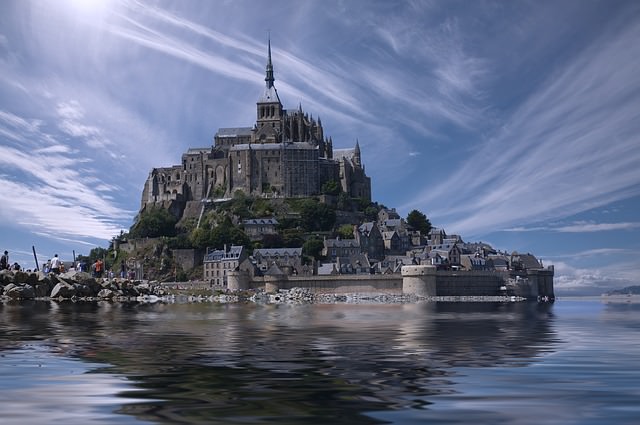
Backpacking in France – Mont saint Michel
Culture in France
What is typical of France and its inhabitants? Surely you have to get used to the fact that French people don’t want to speak any other language than their own – even if they could. The old traditions are not far away anymore. France has always been a rather liberal country. Where else could the first republic come into being? Nevertheless one should not hurt the pride of the French at all as a German.
The insult word boche will then fly fast around your ears. You should also know that there is a two-class society in France. On the one hand the Parisians (not exactly everywhere in the country with the own compatriots likes) and the rest – the so-called provincials. The Frenchman still believes like the English in the great times that belong to the past.
From the once Grand Nación has become a small (petit) related to the influence in world affairs. Leave them in the faith and respect the people. On the other hand, enjoy the typical French flair in one of the thousands of cute little cafés on the street corner.
More Backpacker Information about France
France is not cheap, but also not more expensive than Germany. During the high season the prices in the tourist resorts can increase, but you are used to that from home. 40-60 Euro per day should be enough. France is not one of the cheapest backpacker countries. Those who drive in summer may pay even more.
France is packed with cultural and geographical sensations. Discover them on foot, by bike, by train or whatever. Think of the right backpacker clothes depending on the season and region.
France is a country of gourmets. Look forward to incomparable delicacies.
During your backpacker tour through France you can expect some peculiarities of the locals and exciting insider tips.
As a German citizen you don’t have to worry about entering France. Pay attention to the friendly papers and travel sicknesses…
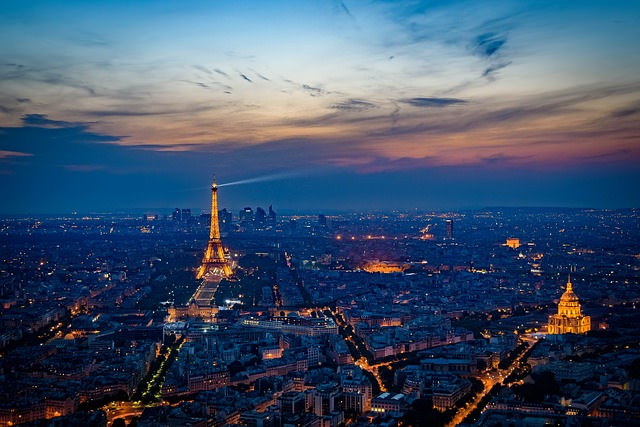
Backpacking in France – Eiffel Tower
Backpacker Route in France
Every region in France has so much to offer that you’d have to put together a single backpacker guide for practically every one of them. During your backpacking trip in France you can concentrate on historical points or discover the geographical beauties of the country. Get to know the beautiful beaches of the Cote d´Azur or Brittany – not to mention the beaches of the Caribbean islands. Or experience typical rural France in the interior. And if you’re drawn to the mountains, you can climb the highest peak of the Alps, Mont Blanc. What’s worth taking on a France backpacker trip?
Route 1: The classic (15-20 days)
- 2-5 days exploring Paris, the capital of France. Some did not want to leave any more.
- 2 days Mont Saint-Michel off the coast of Normandy – the romantic destination
- 3-7 days Nizza, Cannes, and St. Tropez at the Côte d’Azur – dream beaches and lots of money
- 3+ days on the island of Corsica, Carcassonne and Aix-en-Provence in southern France and the Mediterranean.
- 3+ days, months or years French Caribbean flair on the islands of Guadeloupe, Martinique, French Guiana, Réunion and even more exotic on Tahiti (French Polynesia).
- 2 days Bordeaux – city of wine in the southwest of the country. Interesting also La Rochelle
- 2 days Brest in Brittany.
- 2 days Orléans – Jeanne d’Arc made world history here
- 2 days in Strasbourg in Alsace on the German border. Romantic, cultural and innovative.
Route 2: Backpacker Intensive Trip (up to 40 days and more)
- 2-5 days exploring Paris, the capital of France. Some did not want to leave any more.
- 2 days Mont Saint-Michel off the coast of Normandy – the romantic destination
- 3-7 days Nizza, Cannes, and St. Tropez at the Côte d’Azur – dream beaches and lots of money
- 3+ days on the island of Corsica, Carcassonne and Aix-en-Provence in southern France and the Mediterranean.
- 3+ days, months or years French Caribbean flair on the islands of Guadeloupe, Martinique, French Guiana, Réunion and even more exotic on Tahiti (French Polynesia).
- 2 days Bordeaux – city of wine in the southwest of the country. Interesting also La Rochelle
- 2 days Brest in Brittany.
- 2days Orléans – Jeanne d’Arc made world history here
- 2 days in Strasbourg in Alsace on the German border. Romantic, cultural and innovative.
- 2 days to 2 weeks walking along the Grande Randonnée or Sentiers de Grande Randonnée long-distance hiking trails (maps).
- 1 day 100 m high dune dune du Pilat/Pyla in Arcachon
- 2 days luxury resort Deauville
- 1 week the Loire castles depart – like in a fairy tale
- 1 week boat hire and Canal du Midi
Travel times in France
As in the rest of Europe, there is no special travel time as all seasons have their advantages and disadvantages. In the south of France you can also spend the winter without freezing. As a rule, however, you can assume that there is a kind of weather border from the Loire. Further south means a more pleasant climate – on average. The Alps also lie far to the south.
There it is certainly not quite so warm. Nevertheless, at the often stormy French Atlantic coast, there is a rather moderate, mild climate. In the very north it can get wet already. If you want to be active during your backpacker trip, it is best to visit the country in late spring, summer and autumn. Winter sports are possible until March and April in the high altitudes.
Backpacker Budget in France

Budget in France
What is there big to say about the cost of living and travel in France? First of all, they are not much different than in Germany – on average. Of course you can’t compare Paris with a village in the countryside and the prices in the coastal towns during the high season are not the same as in the low season. But you certainly know that from Germany, too. Life in Munich and Norderney is more expensive than in Alzey in the Palatinate or in the furthest corner of Saxony. You have to reckon with heavy costs for the entrance to different museums.
The overnight stay in a Dorm costs however depending upon situation of the Hostel or other accommodations and the travel time exactly the same as in Germany. Calculates 1 Euro for a simple baguette during the backpacking. The Metro or bus ticket in Paris and elsewhere simply costs around 1,70 Euro. Here it is worthwhile to buy the preferential tickets for a longer stay. A middle meal in a simple restaurant costs between 6 and 12 euros. Between 40 and 60 Euro per day without travel expenses you should already have ready.
Bus travel in France
As far as bus transport is concerned, you can count on prices similar to those in Germany. The long-distance buses cross the whole country from east to west and from north to south. Have a look at the websites of the bus companies Eurolines, Megabus or iDBUS for the current prices.
Domestic fares in France
The French are similar to the German domestic fares. Everything depends on the season and the destination. Sure, you’ll get one lump more for a domestic flight from Paris to Nice in midsummer than you do outside the season. But with 50 Euros you’ll be there. You’ll have to find out for yourself if you can save time. It’s hardly worth taking a flight during backpacking, simply because the landscape is too attractive.
Take the train in France
France is a railway nation. The first European high speed trains sailed long before the German ones on the French rail network. The once so admired TGV, but due to a lot of fiddling with the route, it has today become more of a slow train. Many local politicians wanted to connect their villages to the TGV system. The prices for a trip with the TGV in the 2nd class cost in 2015
- Strasbourg – Paris 25€
- Frankfurt – Marseille 39€
- Paris – Bordeaux 20€
- Paris – Rennes 20€
- Paris – Marseille 25€
- Paris – Nantes 20€
On the pages b-europe.com, de.rail.cc, tgv.de.voyages-sncf.com/en/ and www.voyages-sncf.com you can compare prices. Alternatives, if you are not yet 26 years old, are the Interrail-Ticket. Or for all who are older, the Euro-Domino-Ticket.
Backpacker accommodations in France
France is the tourist country in Europe par excellence. Paris alone attracts more visitors every year than many other countries. This also means that France offers every kind of accommodation. From small budget hotels to the most fashionable hostels in the Alps and on the coasts. You can even stay in castles, palaces and monasteries. According to official figures, there are around 20,000 hotels in the country. All are divided into four categories. The lower classes are particularly interesting for backpackers. Simply because you often get clean and nicely furnished rooms for good money at the right time.
If you travel with two people, a simple hotel room is often better than a bed in the dorm of a hostel. It’s best to check the well-known hotel sites for seasonal deals. Or take a look at the French hotel site logishotels.com. The Bed & Breakfast accommodations in France are called Chambres d’Hôtes. A wide range of accommodation awaits you in this category as well. Some super luxurious – others simple.
Good offers can be found at gites-de-france.com – but meanwhile also at Airbnb and others. The accommodation situation is often complicated during the local holiday months in July and August. Without having reserved something in advance – especially on the coasts – there’s hardly anything going on. Otherwise you can look around for cheap accommodation in refuges.
What about the hostels? Of course there are, especially in the cities, but the prices are very high. As I said, a hotel room can be cheaper under certain circumstances. According to the hostel magazine Hostelworld, the average prices for a bed in a dorm are as follows.
- Euro 33 Paris
- Euro 30 Nice
- Euro 21 Marseille
- Euro 36 Lyon
- Euro 29 Strasbourg
- Euro 21 Toulouse
- Euro 40 Lille
- Euro 13 Avignon
- Euro 23 Annecy
- Euro 22 Chamonix
Camping in France
Camping is a cult in France. Near each city, partly also in the cities themselves, there are some camping possibilities. The largest on the coasts. In summer, several thousand campers camp on the sites. Whole camping cities shoot at the time like mushrooms from the soil. Prices depend on the category. You shouldn’t camp in the wild when backpacking. You don’t have to, there are plenty of alternatives.
Backpacker Highlights, Trips & Tips in France
If you’re planning a backpacker trip through France, it’s worth concentrating on one region. There is too much else to see and you would lose yourself. Unless you have enough time. Choose one, two or three of the following provinces according to your wishes and leave them intensively.
- Auvergne
- Burgundy
- Brittany
- Cote d’Azur
- Alsace
- Ile-de-France
- Loire Valley
- Normandy
- Poitou-Charentes
- Provence
- Rhone Alps
Make the west coast or the wine routes in Alsace or Burgundy. Classical and contemporary architecture trips can be made through eastern France or through the mountainous regions. The so-called Sun Road leads through the old and worth seeing cities of Avignon, Aix en Provence, Marseille and Nice, as well as past fantastic beach sections. Romantics should definitely visit the Loire Valley.
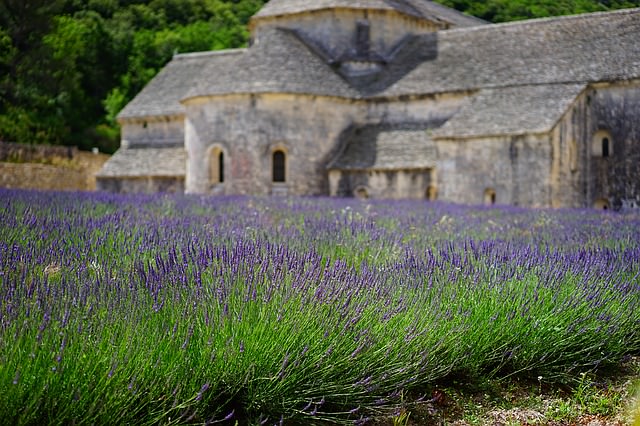
Backpacking in France – Lavender
Backpacker Highlights in France
What must you have seen on a backpacker trip through France? The Eiffel Tower and the Louvre certainly. Also Montmatre and the Place Pigalle. Plus the Paris nightlife. Versailles Castle shows you the pomp and circumstance of the French kings. The D-Day beaches in Normandy are rather something for military fans. The camera should be operational when you visit Mont Saint Michel. Apart from that you can have a good time in the small street cafes and visit the countless marche aux puces, the French flea markets. Interesting cities are Montpellier, Cannes, Monaco, La Rochelle, Paris, Strasbourg, Chartres, Aix, Bayonne and others.
Backpacker insider tips in France
Are there any insider tips in such a touristically organized country? Probably not. Nevertheless, there are always a few locations that are perhaps only visited by the locals. Rent a boat and cruise the Canal du midi comfortably. The Cote d’Argent in Bordeaux has dream beaches ready for you. Genuine fishing flair and gourmet delicacies await you on the Ile de Re and the Ile d’Oleron. You’ll only meet local tourists at Lac de chalain in Fontenu, in the Jura.
Wild coastal landscapes can be found in Cargese on Corsica. Hard trekking tours lead to Ceillac and to Moustiers-Sainte-Marie on the Cote d’Azur. Have you ever heard of Château Gaillard in Normandy? You will encounter a spectacular landscape on Mont Aiguille in Rhone-Alpes. Even more fantastic is Le Palais Idéal, also in Rhone-Alpes. Nearby are the Grottes de la Balme caves. Dreamy villages and towns like Kaysersberg and Colmar are not exactly on the main backpacker route of most.
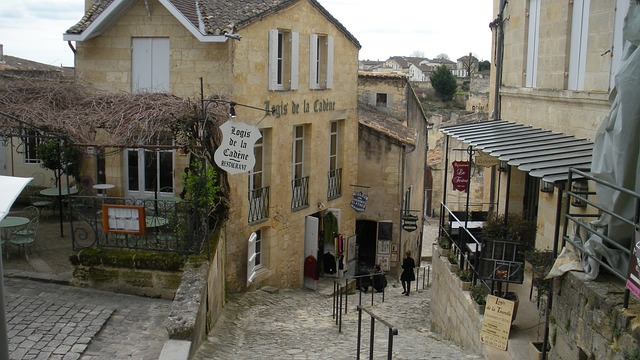
Backpacking in France – Saint Emilion
Food & Drinks in France
Not for nothing is an old saying called “food like God in France”. Probably no other country in the world is as proud of its cuisine as the French. But not everything that comes from French cuisine is good…. but it tastes heavenly anyway. That already starts with the baguette or the floods. A German white bread with sticks is not to be compared with a French one. Goose liver pâté, on the other hand, you should avoid. The critters suffer endless agony while fattening. A café au lait with a fresh croissant is cult in France. You have to treat yourself. Simple and delicious.
Food in France
Those who want to taste the national cuisine will find different specialities depending on the region. While in Alsace and Lorraine sauerkraut and tarte flambée (quiche lorraine) reign, on the coast oysters, mussels and other seafood specialities are the order of the day. You won’t forget an air-dried ham from Bayonne. Check out small corner pubs, restaurants and brasseries for local specialties. Cheese fans should plan a longer stay right away. It is said that there are more than 360 types of cheese in France. So you can try a different one every day of the year.
Croissant, crêpes, Roquefort, Coq au vin, Merguez – all these are delicacies that will pass by in your mouth. Sweetmouths should try Parfaits, Montélimarnougat, Galette des Rois and other addictive treats.
The French devote themselves with devotion to food, but not in the morning. Rather to the other meals. A distinction is made between a gourmet – a gourmet who knows how to enjoy – and a gourmand, a wolverine who stuffs everything into himself. The usual fast food stuff is of course also available when backpacking in France. But who wants that with the offer?
Drinking in France
Wine, wine and more wine. Wine lovers and those who want to become wine lovers can kneel down in France. How about the Wine Route in Alsace? Or taste the fine wines in the world-famous wineries of Bordeaux. Beer is also very good. The best beers come from Alsace, where hops are also grown. The brand 1664 is a popular one. Kronenbourg from Lorraine another. The French are café connoisseurs. Huge coffee machines monsters stand even in the smallest pubs. Café au lait, Café au chocolat and many more variations are available. Schnapps like Calvados from Normandy, Cognac or Absinthe – a Hammerknaller also comes from France.
Backpacker Visa and vaccinations in France
France is a member of the EU. As German citizens, you therefore usually have no problems travelling the country. However, when you start backpacking to France, make sure that your travel documents are up to date in order to avoid problems.
According to the Foreign Office, you will need the following entry documents in order to move freely in France. German citizens can enter France if they are in possession of the following documents:
- Passport: Yes
- Provisional passport: Yes
- Identity card: Yes
- Temporary identity card: Yes, must be valid.
- Children’s passport: Yes
- Still valid child ID according to old model: Yes
- Important also: Every child needs his or her own ID document.
If you want to travel to the overseas departments, you need a valid passport or identity card. A visa is not required.
Medical Information & Vaccinations for France
If you come to France by land, you won’t even be stopped at the border. If you fly directly to the islands from a yellow fever area, you may encounter problems. Make sure you have updated your usual vaccinations. Dengue fever is known in the south of France. Bilharzia is known in Corsica. In the overseas departments it is important to stick to health care concepts like a normal visit to the tropics.
